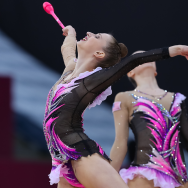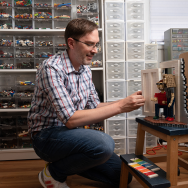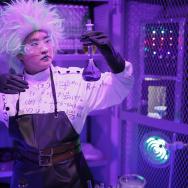Editor’s note: This story is part of ‘Meet a UChicagoan,’ a regular series focusing on the people who make UChicago a distinct intellectual community. Read about the others here.
Ashlyn Sparrow has been obsessed with gaming for years. When she was about 10, her dad bought her a PlayStation—sparking a passion that has grown from a game-filled childhood to a career creating games of her own.
“I’m 32 now, and even though I don’t get an allowance anymore, I still budget for video games,” said Sparrow, a game designer who helps lead the Weston Game Lab at the University of Chicago.
The Weston Game Lab—located in the Media Arts, Data, and Design Center on the first floor of the John Crerar Library—is an expansive classroom and studio space that brings together students, staff and faculty to design and play board games and video games.
As the assistant director, Sparrow works with UChicago students to create games that at once engage the player and address real-world problems, from climate change to public health.
Video games, Sparrow said, “take the best elements from both novels and cinema—like storytelling and music—and add interactivity and player agency.”
This gives games what Sparrow described as an immersive, “mirror-like” quality: Player-driven, alternate reality narratives, she said, can encourage both designers and players to think critically about how our own society works and our role in it.
Sparrow once designed a game to educate young people about tobacco use. Rather than listing the health risks of smoking, she asked them to adopt the role of tobacco companies, marketing to as many people as possible and scoring points as more became addicted. When customers died off from cancer, they had to adopt new marketing strategies and target new groups of people with different products.
“If you tell people to focus on the goal and play to the game’s objective, they absolutely will, without thinking about the consequences of their actions,” Sparrow said. But during a post-game discussion, students still saw themselves as potential customers targeted by tobacco companies, not marketers. “Anytime they see an advertisement in the future, they’ll know exactly what’s happening,” Sparrow said.
Sparrow’s first experience in social impact gaming came as a master’s student in entertainment technology at Carnegie Mellon University—a program she had wanted to attend since high school.
A dual-degree program with the University of Madeira placed her on the Portuguese island of Madeira, where she became the lead game designer for the Museu da Baleia (Whaling Museum). Almost every day on her way to work, she stopped to pick up a sweet roll and fruit at an oceanside bakery, where the grocer always listened politely to her broken Portuguese.
At the museum, Sparrow worked with a team on an exhibit about the history of whaling, ocean life and conservation. She and a group of artists, programmers and scientists created “Eco-Marino,” an experience that would both entertain and inform museum visitors about threats to the ocean like climate change and plastics pollution. They leaned on each other’s expertise to identify marine animals to feature in the game, create a map, and program an Arduino microcontroller and joystick for users.
“To see two kids steering the submarine we’d created—and controlling the arms to pick up [virtual] litter from the ocean—that was a magical moment for me,” Sparrow said.
After finishing her work in Portugal and completing her master’s degree, Sparrow received an offer from the National Security Administration to work in cybersecurity and counterterrorism. She chose to come to the University of Chicago instead. Teaching students game design for social impact, she said, “sounded way better” than not being able to tell people about classified government work.
Today, Sparrow thinks about video games as both works of art and tools for social change. The museum visitors in Portugal who played a virtual role in cleaning up the ocean, for example, got to imagine themselves as agents of change—a step that can help spur tangible progress.
“Designing so many minigames in the social impact space has mapped onto how I view the real world,” Sparrow said. “It’s amazing how many things it’s illuminated.”
The rules we write for human communities, she added, often benefit some at the expense of others. Think of park benches divided to prevent unhoused people from sleeping comfortably, or congressional districts gerrymandered to ensure victory for a particular party.
To make the “game” of real life fairer, Sparrow argues, we need a comprehensive understanding of its rules, and how they relate to issues that matter to us. That idea of “critical making” is one reason Sparrow loves working with UChicago students on game design. By researching topics, writing rules and scripts, and designing interactive elements, they learn about far more than the simple act of programming the movement of a character.
In addition to her role at Weston, Sparrow is involved with the Game Changer Chicago Design Lab and the Center for Interdisciplinary Inquiry and Innovation in Sexual and Reproductive Health (Ci3). In each of those campus spaces, she has worked with students to design games that address complex topics, from reducing environmental degradation to preventing sexual assault.
Peter Forberg, AB’21, AM’21, worked with Sparrow on a dating simulator to address sex and sexuality on college campuses. Sparrow’s upbeat attitude, he recalled, helped encourage him and other students to approach difficult projects.
“She instituted a simple policy: If you’re going to fail, fail terribly, because we learn more from taking risks than from accepting mediocrity,” Forberg said. “This advice has resonated for me everywhere.”
Sparrow has also formed impactful partnerships with UChicago faculty.
“Ashlyn and I have collaborated for nearly a decade now. I’ve learned so much from her,” said Patrick Jagoda, a professor of English, Cinema and Media Studies and Obstetrics and Gynecology who works closely with Sparrow. “Together, we’ve designed and run workshops, summer programs, internships and collaborative design processes, especially focused on youth of color.”
Sparrow and Jagoda are currently working on an “encyclopedic” game which will address issues of race and capitalism in a serial format. Called “After Life,” the project draws inspiration from panoramic literary works like “Finnegans Wake” and “Don Quixote.”
“Novels routinely focus broadly on social problems,” Sparrow said. “But we don’t have an example of that in games. A game might focus on one social issue at a time, but wouldn’t necessarily think about racial capitalism, science and technology, and injustices and speculate about what those things might look like in the future.”
After eight years in Chicago, Sparrow still loves getting to know new students, many of whom call her a thoughtful and committed mentor. Rebecca Husk, AB’20, AM’21, described a lunch with Sparrow as “the most important hour of my entire career.”
“It is entirely because of Ashlyn that I just took on my first full-time job in an experiential design agency,” said Husk, now a project coordinator at the exhibit design firm Luci Creative. “She opened my eyes to an incredible world of puzzles and video games and public spectacle and immersive art and experiences that don’t even really have a genre or name yet.”
Others recalled the kindness that defines Sparrow’s approach to working with students.
“When she’s not beating me at every board game we play together, Ashlyn is consistently the most empathetic and relentlessly positive figure on campus,” said third-year student Noor Amin. “She taught me to deeply consider games as both a career path and an important part of how I interface with myself and the world.”
When Sparrow accepted the job offer at UChicago, she recalled, she wondered about the institution’s reputation for serious scholarship. Would the campus share her excitement for gaming? Her worries were unfounded, she quickly realized. Sparrow’s collaborative work here has only emphasized for her the enormous educational potential of game-based learning—and the pure fun it can bring.
“It’s a really thoughtful, heartfelt community of people that I work with, and I absolutely love them,” Sparrow said. “If you’re ever feeling lonely, come through to the Weston Game Lab.”



